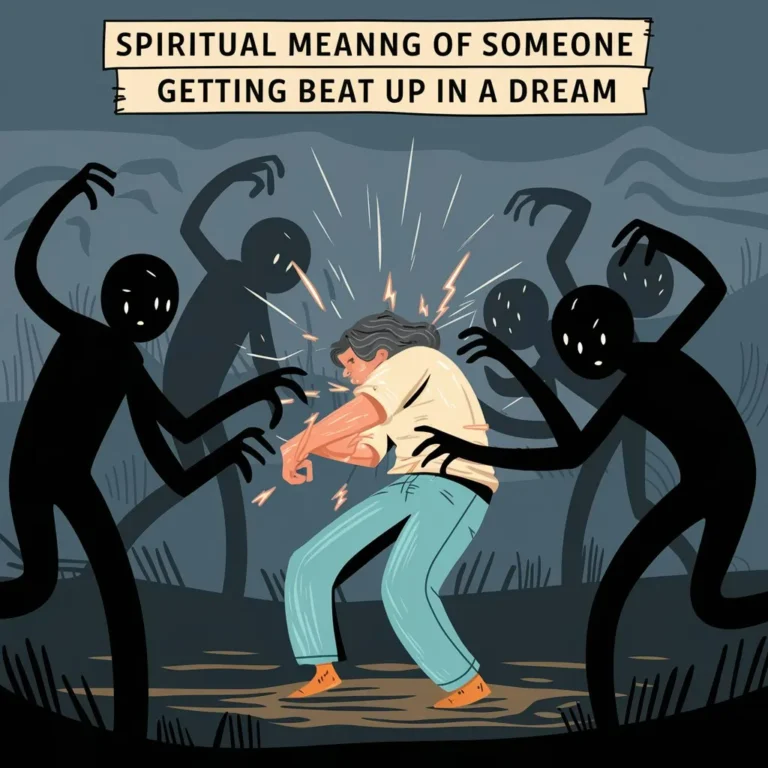Crying in Your Sleep: Spiritual Meaning Explained
Have you ever woken up to find your pillow wet with tears you didn't know you shed? It can feel strange, but it often shows that your feelings are trying to come out. These tears at night can mean you have emotions deep inside you that need attention.
When you cry in your sleep, it might be a sign that something is bothering you. These nighttime tears can help point you toward what you need to heal and understand. As you think about these feelings, you may find new ideas that can help you on your life path. What do you think your mind might be telling you?
Key Takeaways
Crying in your sleep can mean a lot of things. It often happens when you need to let go of feelings you've kept inside. This can help you heal and grow spiritually.
When you cry at night, it might mean that your mind is dealing with worries or stress. These tears can urge you to think about what's bothering you. It's a chance for you to understand your feelings better.
If you dream about crying, it can show hidden emotions. This can help you become more aware of yourself and what you really feel.
Crying at night can also help you connect. It lets you feel more empathy for yourself and others. It's a way to be kinder to yourself, which is very important.
Finally, those tears can give you valuable insights. They can guide you to change and understand your emotions on a deeper level. Embracing your nighttime tears can be a step toward personal growth.
Understanding the Emotional Release Behind Nighttime Tears
Crying in your sleep can be confusing and a little scary. But those tears might be your mind's way of dealing with feelings you didn't face while you were awake. When you cry at night, your heart is often letting go of pain, joy, or even longing. You might carry worries without realizing it, and sleep is a safe place for your feelings to come out.
It's important to remember that you're not alone during these moments. These tears can help you think about deeper emotions. They can encourage you to listen to yourself. What're you really feeling?
Understanding why you cry at night can make you feel more connected to yourself and to others who go through similar experiences. Embrace those moments. They can lead to healing and help you understand what's going on inside you.
The Impact of Stress and Anxiety on Sleep Crying
Stress and anxiety can weigh heavily on you, even while you sleep. Sometimes, they cause you to cry at night. These tears show that there are worries and pressures you haven't dealt with yet.
To help reduce stress and anxiety, try some simple practices. Meditation, deep breathing, or writing in a journal before bed can help you process your feelings. When you take care of your mental health, you create a calm space for your mind and heart.
Understanding your emotions can also help you feel more connected to others. Taking this journey can make you feel like you belong and improve your overall well-being.
Dream Symbolism: What Your Dreams Are Trying to Tell You
Crying in your sleep often shows that you have deeper feelings and struggles. Your dreams act like a mirror, showing you emotions you mightn't realize while you're awake. Understanding your dreams can help you find out what's going on inside you.
Sometimes, your dreams guide you to heal. They might encourage you to face your fears or talk about feelings you've kept hidden. Think of these dreaming moments as chances to learn more about yourself and grow.
By figuring out what your dreams are trying to say, you can feel more connected to yourself and others. You might also find a stronger sense of belonging.
Trust your dreams. They can help you find clarity and understanding in your life.
Unresolved Issues and Their Manifestations in Sleep
When you sleep, your mind can bring up problems you've been thinking about while awake. Sometimes, you may even cry in your sleep. This shows that your worries are still there, waiting to be dealt with. These feelings can come from things that happened in the past or feelings you haven't shared with anyone.
Crying in your sleep is your mind's way of releasing these emotions. It's like your brain tries to help you understand what you're feeling, even if you can't face it during the day.
It's important to notice these moments; they remind you that it's okay to feel upset sometimes. Don't be afraid of these feelings. Accepting them is the first step to feeling better.
Spiritual Awakening: Crying as a Sign of Growth
Unresolved feelings don't just stick around; they often show you're growing spiritually. If you cry in your sleep, it can mean you're changing on the inside. These tears might look messy, but they help clear away old emotions, making room for your spiritual growth.
Feeling vulnerable is normal during this time. When you embrace your feelings, you connect more with yourself and live a more true life. You're not the only one. Many people feel their emotions deeply as they look for clarity in their lives.
Each tear you shed brings you closer to understanding yourself better. So, let your emotions flow; they guide you to a healthier and happier spirit.
The Role of Empathy and Compassion in Emotional Tears
Emotions can often feel lonely, but they can also connect us to others through empathy and compassion. When you cry, you aren't just showing your feelings; you're inviting others to join in on what it means to be human.
Understanding your feelings helps you also understand the feelings of those around you. Sharing our tears and struggles can build strong bonds between people. It's a way to show that we care for each other.
Tears therapy can help you look at your feelings and also understand what others are going through. In these moments, when tears flow, you realize you belong to something bigger. You remember that you're never truly alone.
Crying as a Form of Healing: Letting Go of the Past
Crying can help you heal, especially when you're ready to move on from the past. When you let yourself cry, you let out feelings that can turn hurt into strength. Each tear helps you release emotions and face what's been bothering you. In your sadness, you might find the power to feel free.
Healing isn't a straight path. It can go in unexpected ways, but each tear helps you understand and accept what you have been through.
Crying honors your feelings and helps you feel connected. It's okay to let these emotions out. Doing so can help you feel lighter and stronger as you move forward.
Nighttime Crying and Its Connection to Intuition
Sometimes, feelings come up while you sleep. When you cry at night, it means more than just feeling sad. It often shows deep thoughts or worries that your awake mind might miss. These tears can help you connect with what you really feel inside. They may bring out fears, hopes, or problems that you need to think about.
Crying at night can feel strange, but it might be your intuition telling you to pay attention to your feelings. It's okay to feel this way.
Sharing this experience can help you feel less alone and remind you that many people go through similar things. By accepting these moments, you can learn more about your emotions and what matters to you.
A Call for Self-Reflection: Understanding Your Emotions
Feelings can be strong, especially at night when it's quiet. If you find yourself crying, know that it's okay. These tears can show you what's going on inside you.
Try writing in a journal. This can help you share your thoughts and feelings without worrying about judgment.
When you read what you've written later, you might see patterns in your feelings, fears, and hopes that you didn't notice before.
It's normal to feel vulnerable sometimes, and that's a part of knowing yourself better. Understanding your feelings can help you connect with yourself and with others.
Navigating Your Spiritual Journey Through Nighttime Tears
Nighttime tears can be important for your spiritual journey. When you cry at night, it isn't just a sign of sadness. Your tears help clean out heavy feelings and make room for new growth.
When you wake up and feel those deep feelings lingering, take a moment to recognize them. It's okay to feel vulnerable. This is part of processing what's inside you. Each tear helps you let go of old feelings and brings in fresh energy for your growth.
You're not alone in this. Many people feel the same way. These emotions connect us all. So, honor your feelings and let them help you understand yourself better.
Embrace the journey and trust that each tear can lead you to new insights.
Frequently Asked Questions
Can Crying in Sleep Indicate Underlying Psychological Issues?
Crying in your sleep can mean a lot of things. It often shows that your brain is letting out strong emotions or trying to deal with past hurts. When you cry while you sleep, it might be your mind's way of saying it needs to heal.
Understanding this can help you connect better with your feelings. It's a chance to learn more about what you are going through. Talking about these feelings with friends or family can also help you feel better and closer to them. Remember, it's okay to cry. Everyone has tough times, and sharing your feelings is a good step toward feeling better.
How Can One Prevent Crying During Sleep?
To stop crying during sleep, you can focus on your sleep habits and feelings. Try to create a calming bedtime routine. Do things like reading a book or listening to gentle music before bed. Go to sleep and wake up at the same time every day. This helps your body feel settled.
Also, pay attention to your feelings. Talk about what worries you or makes you sad. Finding a safe space to express your emotions can help you feel better. When you feel safer with your feelings, you might cry less when you sleep. Remember, it's okay to feel emotions; it's a normal part of life.
Are There Specific Dreams Linked to Sleep Crying?
Some dreams can make you feel really strong emotions, and they might even make you cry in your sleep. These dreams often reflect feelings or problems you haven't worked through yet. The things you dream about can connect to your life experiences. They can help you understand yourself better and help with healing. Dreams allow you to open up and connect with your feelings and others in your life.
Is Sleep Crying More Common Among Certain Age Groups?
Yes, sleep crying happens more often in younger and older people. Children often have strong feelings at night due to things they've experienced during the day. Older adults might cry in their sleep because of feelings of worry or sadness. This shows that our emotions are part of every stage of life, connecting us in many ways.
What Physical Health Conditions May Be Associated With Nighttime Tears?
Nighttime tears can happen for many reasons. They might be linked to sleep problems or stress. If you wake up feeling sad or anxious, it may be your body's way of showing you that you need to deal with some feelings.
Feeling this way is common, and you are not alone. It's okay to talk to someone about it, like a friend or a professional. They can help you understand what you're feeling and find ways to feel better. Remember, taking care of your feelings is just as important as taking care of your body.

I’m Eliza Trinity, a spiritual guide and writer at SoulfulSignificance.com, where my mission is to illuminate the path of spiritual fulfillment through Christ’s teachings. With a Theology degree and a counseling background, I blend biblical wisdom with real-world insight to support those on their journey to discovering their soul’s significance.




